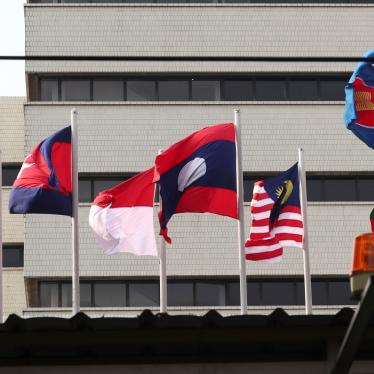(New York) - The Thai government should ensure that people detained under emergency regulations during the recent political violence are not held in secret detention or mistreated, Human Rights Watch said today.
This week Thai security forces forcibly dispersed thousands of supporters of the United Front for Democracy Against Dictatorship (UDD), known as the Red Shirts, who had encamped in Bangkok's commercial district since March and had engaged in increasingly violent actions. The government arrested several UDD leaders and many of their supporters.
"This terrible crisis is no excuse for mistreating detained protesters or holding them in secret detention," said Elaine Pearson, acting Asia director at Human Rights Watch. "Those who committed crimes should be properly charged, but all should be treated according to international human rights standards and due process of law."
On April 7, 2010, Prime Minister Abhisit Vejjavija declared a state of emergency in Bangkok and other provinces in response to the UDD demonstrations and law-breaking. Tensions intensified since May 14, resulting in Thailand's most brutal street fighting in decades as government security forces engaged heavily armed anti-government militants mixed in among non-violent UDD protesters in Bangkok. Armed confrontations have resulted in at least 52 deaths and more than 450 injuries, and violence has spread to other parts of the country.
The Thai government's use of its draconian Emergency Decree on Public Administration in a State of Emergency ("Emergency Decree") raises concerns that the rights of detained protesters will not be respected, Human Rights Watch said. The Emergency Decree provides Thai authorities with legal immunity and broad powers to detain individuals without charge in informal places of detention. It does not ensure either effective judicial oversight or prompt access to legal counsel and family members. The government's Center for the Resolution of Emergency Situations (CRES) has so far failed to provide information about the number of detainees and their current whereabouts, heightening concerns about mistreatment.
The risk of "disappearances," torture and other ill-treatment significantly increases when detainees are held incommunicado in unofficial locations and under the control of the military, which lacks training and experience in civilian law enforcement, Human Rights Watch said.
Human Rights Watch expressed alarm at reports that the Emergency Decree is being used to hold persons in unofficial places of detention, such as military camps, instead of in police stations and jails. On April 22, the CRES ordered the use of three military camps in Prachinburi and Kanchanaburi provinces to detain protesters. On May 19, it was reported that a Border Patrol Police camp in Petchaburi province will be specifically used for detaining and interrogating leaders of the UDD, including Jatuporn Prompan, Nathawut Saikua, Veera Musikhapong, Weng Tojirakarn Korkaew Pikulthong, Kwanchai Praipana, Wiphuthalaeeng Pattanaphumthai, Nisit Sinthuprai, and Yosvaris Chuklom.
Since April 15, the CRES has also summoned hundreds of politicians, former government officials, businessmen, activists, academics, and community radio operators, to answer allegations of involvement in the ongoing protests. Under the Emergency Decree, the CRES is empowered to arrest all who fail to appear.
"Secret detention sites and unaccountable officials are a recipe for human rights abuses," Pearson said. "Those arrested should be promptly brought before a judge and charged with a criminal offense or released."






